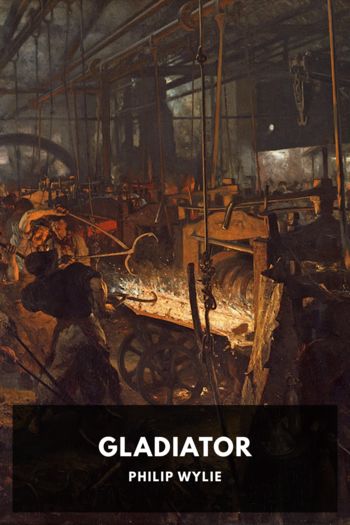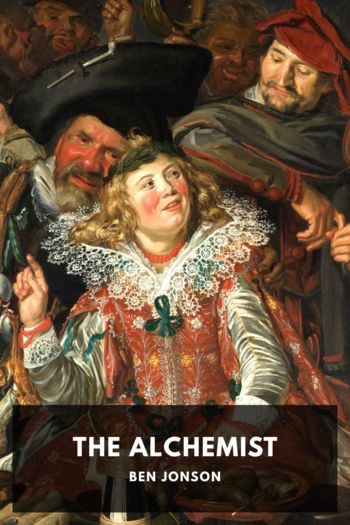Gladiator - Philip Wylie (classic novels for teens txt) 📗

- Author: Philip Wylie
- Performer: -
Book online «Gladiator - Philip Wylie (classic novels for teens txt) 📗». Author Philip Wylie
The earth spun and rocked slowly. He was paying his first price for losing his temper. “Killed him?”
“His neck was broken—in three places.”
Some of the others heard. They walked away. Presently Hugo was standing alone on the cinders outside the stadium. Lefty came up. “I just heard about it. Tough luck. But don’t let it break you.”
Hugo did not answer. He knew that he was guilty of a sort of murder. In his own eyes it was murder. He had given away for one red moment to the leaping, lusting urge to smash the world. And killed a man. They would never accuse him. They would never talk about it. Only Woodman, perhaps, would guess the thing behind the murder—the demon inside Hugo that was tame, except then, when his captain in jealous and inferior rage had struck him.
It was night. Out of deference to the body of the boy lying in the Webster chapel there was no celebration. Every ounce of glory and joy had been drained from the victory. The students left Hugo to a solitude that was more awful than a thousand scornful tongues. They thought he would feel as they would feel about such an accident. They gave him respect when he needed counsel. As he sat by himself, he thought that he should tell them the truth, all of them, confess a crime and accept the punishment. Hours passed. At midnight Woodman called.
“There isn’t much to say, Hugo. I’m sorry, you’re sorry, we’re all sorry. But it occurred to me that you might do something foolish—tell these people all about it, for example.”
“I was going to.”
“Don’t. They’d never understand. You’d be involved in a legal war that would undoubtedly end in your acquittal. But it would drag in all your friends—and your mother and father—particularly him. The papers would go wild. You might, on the other hand, be executed as a menace. You can’t tell.”
“It might be a good thing,” Hugo answered bitterly. “Don’t let me hear you say that, you fool! I tell you, Hugo, if you go into that business, I’ll get up on the stand and say I knew it all the time and I let a man play on my team when I was pretty sure that sooner or later he’d kill some one. Then I’ll go to jail surely.”
“You’re a pretty fine man, Mr. Woodman.”
“Hell!”
“What shall I do?” Hugo’s voice trembled. He suffered as he had not dreamed it was possible to suffer.
“That’s up to you. I’d say, live it down.”
“Live it down! Do you know what that means—in a college?”
“Yes, I think I do, Hugo.”
“You can live down almost anything, except that one thing .murder. It’s too ugly, Woodie.”
“Maybe. Maybe. You’ve got to decide, son. If you decide against trying—and, mind you, you might be justified—I’ve got a brother-in-law who has a ranch in Alberta. A couple of hundred miles from any place. You’d be welcome there.”
Hugo did not reply. He took the coach’s hand and wrung it. Then for an hour the two men sat side by side in the darkness. At last Woodman rose and left. He said only: “Remember that offer. It’s cold and bleak and the work is hard. Good-night, Hugo.”
“Good-night, Woodie. Thanks for coming up.”
When the campus was still with the quiet of sleep, Hugo crossed it as swiftly as a specter. All night he strode remorselessly over the country roads. His face was set. His eyes burned. He ignored the trembling of his joints. When the sky faded, he went back. He packed his clothes in two suitcases. With them swinging at his side, he stole out of the Psi Delta house, crossed the campus, stopped. For a long instant he stared at Webster Hall. The first light of morning was just touching it. The debris collected for a fire that was never lighted was strewn around the cannon. He saw the initials he had painted there a year and more ago still faintly legible. A lump rose in his throat.
“Good-by, Webster,” he said. He lifted the suitcase and vanished. In a few minutes the campus was five miles behind him—six—ten—twenty. When he saw the first early caravan of produce headed toward the market, he slowed to a walk. The sun came over a hill and sparkled on a billion drops of dew. A bird flew singing from his path. Hugo Danner had fled beyond the gates of Webster.
A YEAR passed. In the harbor of Cristobal, at the northern end of the locks, waiting for the day to open the great steel jaws that dammed the Pacific from the Atlantic, the Kalrina pulled at her anchor chain in the gentle swell. A few stars, liquid bright, hung in the tropical sky. A little puff of wind coming occasionally from the south carried the smell of the jungle to the ship. The crew was awakening.
A man with a bucket on a rope went to the rail and hauled up a brimming pail from the warm sea. He splashed his face and hands into it. Then he poured it back and repeated the act of dipping up water.
“Hey!” he said.
Another man joined him. “Here. Swab off your sweat. Look yonder.”
The dorsal fin of a shark rippled momentarily on the surface and dipped beneath it. A third man appeared. He accepted the proffered water and washed himself. His roving eye saw the shark as it rose for the second time. He dried on a towel. The off-shore breeze stirred his dark hair. There was a growth of equally dark beard on his tanned jaw and cheek. Steely muscles bulged under his shirt. His forearm, when he picked up the pail, was corded like cable. A smell of coffee issued from the galley, and the smoke of the cook’s fire was wafted on deck for a pungent moment. Two bells sounded. The music went out over the water in clear, humming waves.
The man who had come first from the forecastle leaned his buttocks against the rail. One end of it had been unhooked to permit the discharge of mail. The rail ran, the man fell back, clawing, and then, thinking suddenly of the sharks, he screamed. The third man looked. He saw his fellow-seaman go overboard. He jumped from where he stood, clearing the scuppers and falling through the air before the victim of the slack rail had landed in the water. The two splashes were almost simultaneous. A boatswain, hearing the cry, hastened to the scene. He saw one man lifted clear of the water by the other, who was treading water furiously. He shouted for a rope. He saw the curve and dip of a fin. The first man seized the rope and climbed and was pulled up. The second, his rescuer, dived under water as if aware of something there that required his attention. The men above him could not know that he had felt the rake of teeth across his leg—powerful teeth, which nevertheless did not penetrate his skin. As he dived into the green depths, he saw a body lunge toward him, turn, yawn a white-fringed mouth. He snatched the lower jaw in one hand, and the upper in the other. He exerted his strength. The mouth gaped wider, a tail twelve feet behind it lashed, the thing died with fingers like steel claws tearing at its brain. It floated belly up. The man rose, took the rope, climbed aboard. Other sharks assaulted the dead one.
The dripping sailor clasped his savior’s hand. “God Almighty, man, you saved my life. Jesus!”
“That’s four,” Hugo Danner said abstractedly, and then he smiled. “It’s all right. Forget it. I’ve had a lot of experience with sharks.” He had never seen one before in his life. He walked aft, where the men grouped around him.
“How’d you do it?”
“It’s a trick I can’t explain very well,” Hugo said. “You use their rush to break their jaws. It takes a good deal of muscle.”
“Anyway—guy—thanks.”
“Sure.”
A whistle blew. The ship’s were lining up in order of their arrival for admission to the Panama Canal. Gatun loomed in the feeble sun of dawn. The anchor chain rumbled. The Katrina edged forward at half speed.
The sea. Blue, green, restless, ghost-ridden, driven in empty quarters by devils riding the wind, secretive, mysterious, making a last gigantic, primeval stand against the conquest of man, hemming and isolating the world, beautiful, horrible, dead god of ten thousand voices, universal incubator, universal grave.
At one of the smaller South Pacific islands an accident to the engine forced the Katrina to linger for two weeks. It was during those two weeks, in a rather extraordinary manner, that Hugo Danner laid the first foundation of the fortune that he accumulated in his later life. One day, idling away a leave on shore in the shade of a mighty tree, he saw the out-riggers of the natives file away for the oyster beds, and, out of pure curiosity, he followed them. For a whole day he watched the men plunge under the surface in search of pearls. The next day he came back and dove with one of them.
Hugo’s blood, designed to take more oxygen from the air, and his greater density fitted him naturally for the work. The pressure did not make him suffer and the few moments granted to the divers beneath the forbidden element stretched to a longer time for him.
On the second day of diving he went alone. His amateur attempt had been surprisingly fruitful. Standing erect in the immense solitude, he searched the hills and valleys. At length, finding a promising cluster of shellfish, he began to examine them one by one, pulling them loose, feeling in their pulpy interior for the precious jewels. He occupied himself determinedly while the Katrina was waiting in Apia, and at the end of the stay he had collected more than sixty pearls of great value and two hundred of moderate worth.
When the Katrina turned her prow westward again, Hugo worked with his shipmates in a mood that had undergone considerable change. There was no more despair in him, little of the taciturnity that had marked his earliest days at sea, none of the hatred of mankind. He had buried that slowly and carefully in a dull year of work ashore and a





Comments (0)